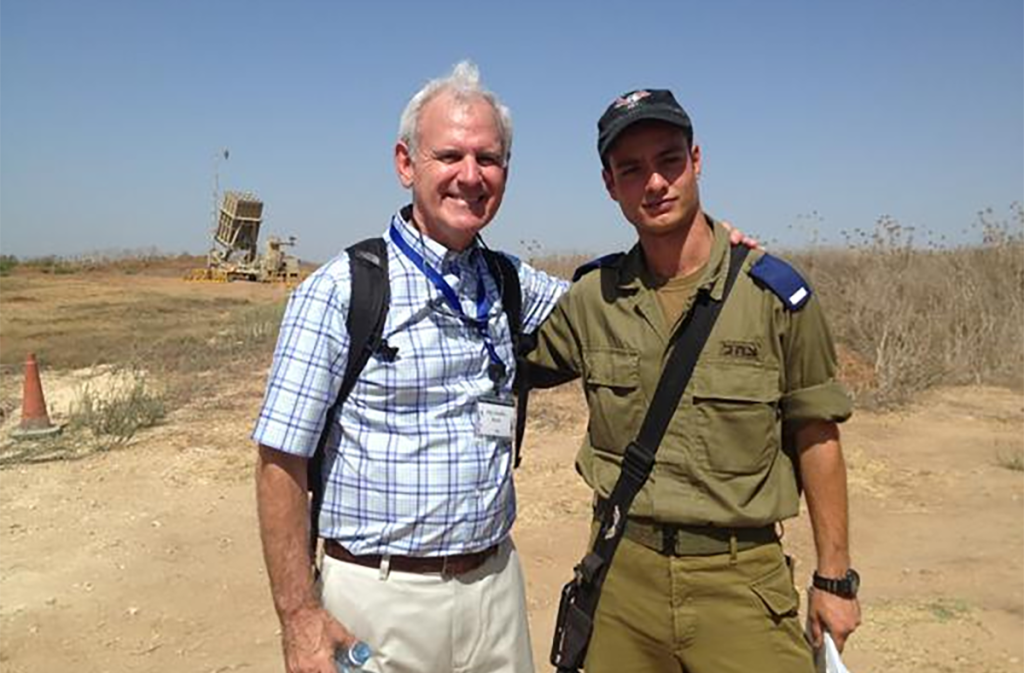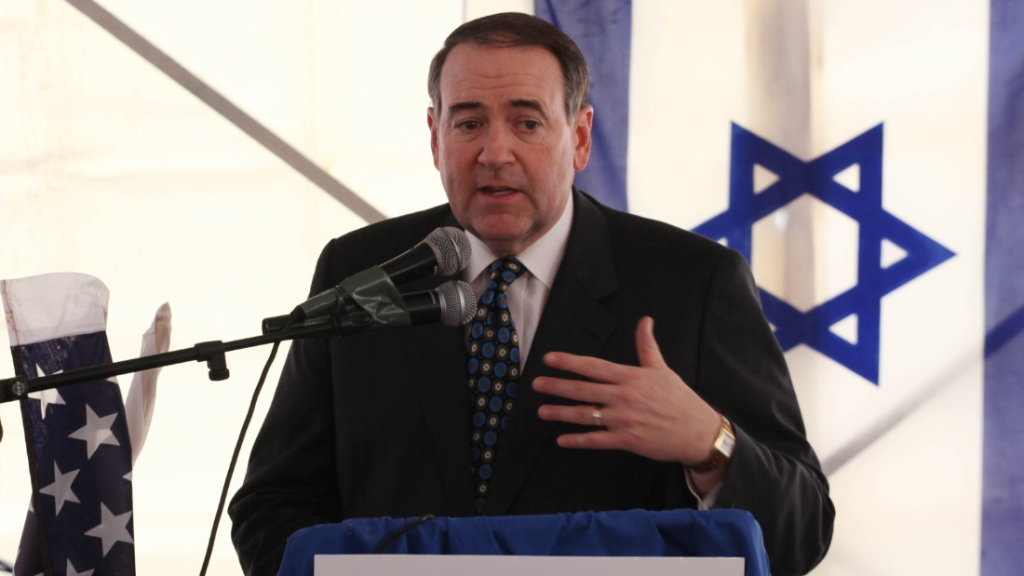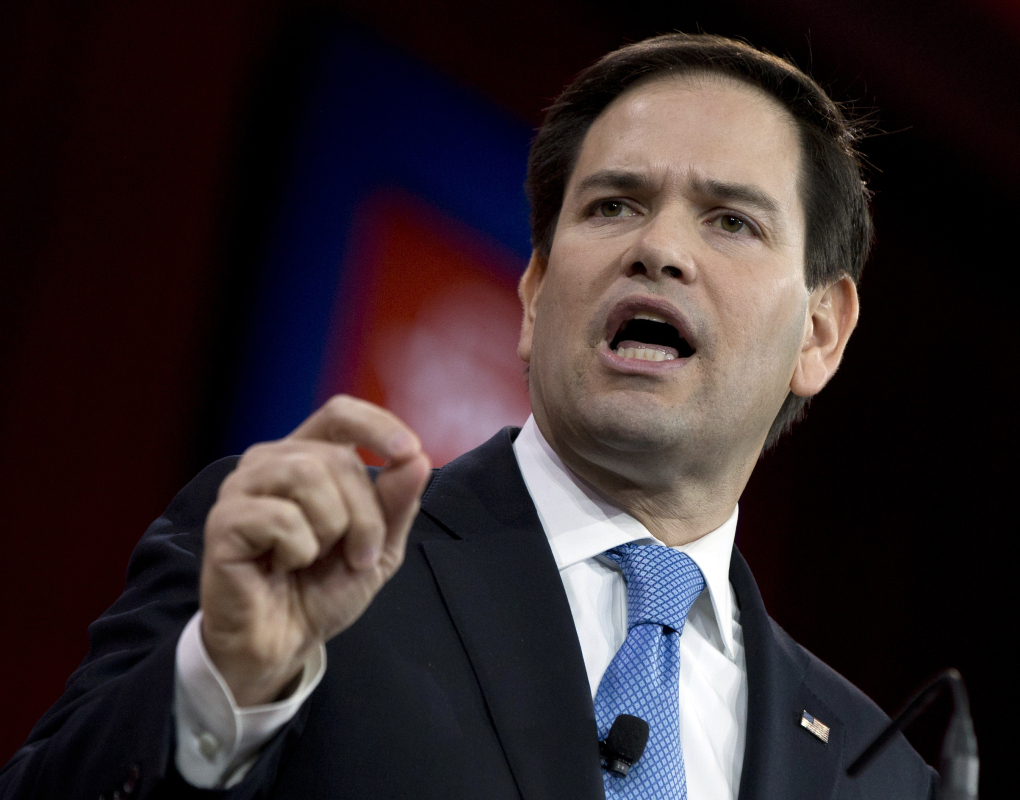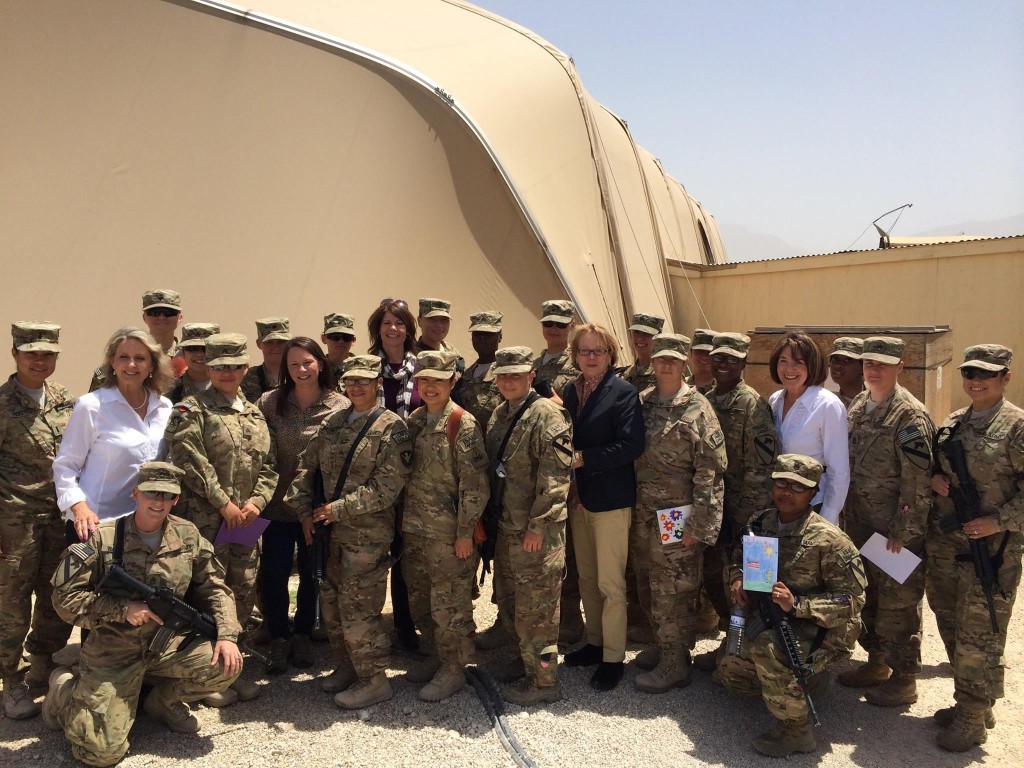Pew Research: Republicans, Democrats have starkly different foreign affairs priorities

A new comprehensive study on American views on foreign affairs finds to no surprise that Republicans are from Mars and Democrats from Venus, but also finds Republican presidential candidate Donald Trump‘s supporters more isolationist than anyone. The survey, released Thursday by the Pew Research Center, finds that Democrats consider the nation’s biggest global fears to be climate change, ISIS, cyberattacks and disease pandemics, and few lose much sleep over threats to the United States from Syrian refugees, China or Russia. Republicans, on the other hand, worry about just about every global menace except climate change, and their biggest concerns are ISIS, cyberattacks, Syrian refugees, and global economic instability. The same survey breaks out foreign affairs issues by candidate supporter, and finds Trump’s supporters far less likely than other candidates’ to want to see the United States intervene militarily or economically in other countries. Trump supporters are most likely to want to see the United States spend more on the war on terror and more on the U.S. military, while also saying America is already too involved overseas. Trump supporters mainly want to see America provide foreign aide. Overall, the survey found a relatively broad isolationist viewpoint. “The public views America’s role in the world with considerable apprehension and concern. In fact, most Americans say it would be better if the U.S. just dealt with its own problems and let other countries deal with their own problems as best they can,” Pew reports in its survey, “Public Uncertain, Divided Over America’s Place in the World,” posted Thursday. Among the lengthy report’s findings: Overall, 45 percent of Americans think military spending should stay about as it is, while 35 percent believe that it should be increased and 24 percent think it should be decreased. There is a dramatic split by party, however; 61 percent of Republicans think military spending needs to be increased, compared with 31 percent of independents and 20 percent of Democrats. Overall, 57 percent of Americans think the U.S. should deal with its own problems for now, and 37 percent believe that it should help other countries with their problems. Similarly, 41 percent of Americans think the country is doing too much to support other countries, 28 percent think the current programs are just about right, and 27 percent think they’re not enough. 65 percent of Trump supporters believe U.S. foreign aid is a bad thing, while 55 percent of Democrat Hillary Clinton supporters think it’s a good thing. Supporters of Democrat Bernie Sanders and now ex-candidates Republicans U.S. Sen. Ted Cruz and Ohio Gov. John Kasich are all pretty evenly split on the question. Overall, 54 percent of Americans think the United States is the world’s leading economic power; followed by 34 percent who believe it is China; 6 percent, Japan; and 2 percent the European Union. Overall, 72 percent of Americans think the United States is the world’s leading military power; followed by 12 percent who believe it is China, 10 percent, Russia; and 2 percent the European Union. 91 percent of Republicans think that ISIS and similar groups are a major threat to U.S. security, while 76 percent of both Democrats and independents think that. 77 percent of Democrats believe climate change is a major threat to U.S. security, compared with 52 percent of independents and 26 percent of Republicans. 77 percent of Trump supporters sympathize with Israel and 10 percent with Palestinians. For Clinton supporters the split is 47 to 27 percent; For Sanders supporters it’s 33 to 39 percent. Trump and Clinton supporters generally agree on the balance between homeland protection measures and civil liberties, while Sanders supporters disagree: 66 percent of Trump’s supporters think the country’s anti-terrorism policies have not gone far enough, and 20 percent think too far, threatening civil liberties. For Clinton’s supporters the split is 51 to 35 percent, while for Sanders’ its 33 to 51 percent. 54 percent of Trump’s supporters think the U.S. does too much to try to solve the world’s problems. For Clinton’s supporters, it’s 34 percent and for Sanders’, 42 percent. Overall, 41 percent of Americans think so. Overall, 49 percent of Americans think that U.S. involvement in the global economy is a bad thing, and 44 percent a good thing. The opposition was more pronounced among Republicans, older people and people with limited educations. People ages 18 to 29, college graduates and liberals were the only groups that mostly thought involvement in the global economy is a good thing. Landslide majorities of Trump’s supporters oppose the U.S. importing more goods, increasing investment in developing countries and increasing foreign aid. Strong majorities, sometimes over 60 percent, of both Clinton’s and Sanders supporters support those policies. 85 percent of Trump’s supporters think the Syrian/Iraqi refugee crisis is a significant threat to America, while only 40 percent of Clinton’s supporters think so, and only 34 percent of Sanders’. Strong majorities of every party and candidate constituency support the current U.S. military campaign against ISIS, ranging from 56 percent of Sanders’ supporters to 66 percent of Trump’s supporters. But almost no group majority believes that the anti-ISIS campaign is actually going well, except for Clinton’s supporters (57 percent.) The biggest difference by party is on the question of whether overwhelming use of military force against global terrorism is a good thing or bad thing. Republicans think it is the best way to defeat terrorism, by 70 percent to 24 percent. Democrats think it would only inspire more worldwide hatred of the U.S., leading to more terrorism, by 65 percent to 31 percent. Independents were pretty split, leaning slightly toward worrying about fostering worldwide hatred (49 percent to 45 percent.) Most of the analysis in the Pew report is based on telephone interviews conducted April 12-19 among a national sample of 2,008 adults, 18 years of age or older, living in all 50 U.S. states and the District of Columbia (505 respondents were interviewed on a landline telephone, and 1,503 were interviewed on a cellphone, including 914 who had no landline telephone). Some
Kay Ivey: Alabama’s longstanding partnership with Israel

Alabama has a long history of strong support for the State of Israel. Alabama lead the nation as the first state to officially call for the establishment of the Jewish state and homeland. At a time in the midst of World War II, when war was waging between America and Nazi Germany, but also systematic extermination and mass murders of the Jews in Europe was occurring, the Alabama Legislature made a pledge to stand with Israel. In 1943, a Joint Resolution was unanimously adopted. For more than 70 years, the State of Alabama has repeatedly demonstrated its pledge to stand with Israel. In 1981, Governor Fob James hosted a celebration of the 33rd Anniversary of Israel’s rebirth as a nation at the Governor’s mansion. In 1997, Alabama and Israel entered in a State-to-State Trade Agreement, signed by Governor James, to promote the exchange of manufacturing goods. In 2012, Israel ranked as Alabama’s ninth leading trade partner. Trade continues today as Alabama has exported $37 million of goods to Israel in 2015. In the wake of the September 2001 terrorist attacks, the Alabama Legislature passed another Joint Resolution to express support for Israel and for all the people suffering at the hands of terrorism. Governor Bob Riley declared August 14, 2006, “Stand with Israel Day” in Alabama. In 2012, Governor Robert Bentley and other state leaders publicly supported Israel to defend itself against years of deadly rockets fired from the Palestinian-controlled Gaza Strip. In 2013, by way of a Proclamation by the Governor, Alabama once again expressed its steadfast support of the State of Israel. On April 7, 2016, the Alabama Legislature invited Deputy Speaker of the Israeli Knesset, Hilik Bar, to address a Joint Session of the Legislature. Speaker Bar is the highest ranking Israeli official to visit Alabama. On the same day, SB81 by Senator Orr was passed out of the Senate that would require that all government entities must include a provision in certain purchasing contracts assuring that the business providing the good or service is not currently engaged in, and will not engage in, the boycott of an entity doing business with a jurisdiction with which the state can enjoy free trade. SB81 is currently awaiting passage by the House. In a time when the Middle East is threatened by terrorism, Israel’s sovereignty continues to be challenged. Alabama has proved for more than 70 years that our support is unwavering. As the first state in the country to call for the establishment of the State of Israel, Alabama stands committed to the existence and establishment of the democratic state in the Middle East. We will continue to contribute efforts to strengthening our state-to-state relationship. Alabama remains committed to stand with Israel. • • • Kay Ivey is the lieutenant governor of Alabama. Elected in 2010, she was the first Republican woman to hold the office in Alabama’s history.
Mike Rogers: We must support Israel

As both an American and a Christian, I believe in defending freedom – especially when it comes to Israel. It is critical the U.S. stands up for Israel, supporting our greatest ally in the conflicted Middle East. Israel’s national security should be a top concern since we are linked to them culturally, politically and historically. The Obama Administration’s relationship with Israel over the past seven years has been strained close to the breaking point. President Obama has neglected Israel and left them without many of the resources they need. This is evident by Prime Minister Benjamin Netanyahu canceling his trip to the U.S. earlier this month. Rather than President Obama’s position of apologizing for American values, I believe we should actively stand strong with Israel and protect her interests. Those interests are especially in jeopardy because of Obama’s highly questionable deal with Iran. When talking to folks across East Alabama, the importance of Israel is one issue I consistently hear about for religious, historic and defense-related reasons. I am working hard to make sure that this important issue remains a priority in Washington. As Chairman of the House Armed Services Strategic Forces subcommittee, I have the great honor to directly work with Israel on their defense capabilities. This subcommittee amongst other things oversees the U.S. Missile Defense Agency, which leads our cooperative development efforts, co-production and procurement programs with Israel. For instance, I have worked closely on their Iron Dome short-range rocket defense system. This system serves as one of Israel’s main defenses against hostile rocket and mortar attacks along with several other missile systems. I am also proud to note that Alabama will take part in helping protect Israel as production of Iron Dome parts will take place in our great state. Earlier this week, I was given the opportunity to speak on two panels at the AIPAC Policy Conference—the largest conference for policy minds and Members of Congress to discuss ideas solely focused on improving relations between the United States and Israel. The focus of my remarks at the conference centered on U.S.-Israel missile defense cooperation and that our strong relationship with Israel should never be in question. • • • Mike Rogers is a member of U.S. Congress representing Alabama’s 3rd Congressional District.
Donald Trump calls Mideast peace ‘toughest deal’

Donald Trump says that if he’s elected president, he’ll know within six months whether he can achieve an elusive peace accord between Israelis and Palestinians, one of the world’s most vexing challenges. But the Republican presidential candidate says he has doubts about each side’s commitment to the peace process. “I have a real question as to whether or not both sides want to make it,” Trump said in an interview with The Associated Press. The Republican presidential front-runner said his concerns are greater regarding “one side in particular.” While Trump wouldn’t say whether he was referring to the Israelis or the Palestinians, he said the chances for a lasting peace rest with Israel. “A lot will have to do with Israel and whether or not Israel wants to make the deal — whether or not Israel’s willing to sacrifice certain things,” Trump said. “They may not be, and I understand that, and I’m OK with that. But then you’re just not going to have a deal.” “If I win, I’ll let you know six months from the time I take office,” he added. Trump was short on specifics about how he would tackle trying to broker peace in the Middle East, or even whether he supports the longstanding U.S. government goal of a two-state solution — saying he didn’t want to show any bias in favor of one side or the other in case he does become president. “Look, we show our cards too much in negotiations,” Trump said. Still, the billionaire businessman who has made his skills as a dealmaker a key piece of his pitch to voters was visibly enthusiastic about the prospect of tackling the intractable foreign policy challenge. “I think if I get elected, that would be something I’d really like to do,” Trump said during the interview at his golf club in northern Virginia. “Because so much death, so much turmoil, so much hatred — that would be to me a great achievement. As a single achievement, that would be a really great achievement.” Trump said a key to peace negotiations would be meeting early in his presidency with top leaders in the region. He said he planned to meet Israeli Prime Minister Benjamin Netanyahu during a trip to Israel “sometime after Christmas, probably.” “You know, I’m going to be probably going over there pretty soon and I want to see him, I want to see other people, I want to get some ideas on it,” he said. He added that the trip had been in the works long before rival Ben Carson’s recent trip to Jordan to visit Syrian refugees. Trump said he was a “big, big fan” of Israel. Yet his questioning of Israel’s commitment to a lasting peace with its Palestinian neighbors could still raise eyebrows in some Republican corners. Trump sat down and shared his views on Israel in an AP Conversation — a series of extended interviews with the 2016 candidates to become the nation’s 45th president. ___ During his unexpected five-month run atop the Republican field, Trump’s rivals for the GOP nomination have argued he lacks depth and fluency on foreign policy. At the heart of his campaign is Trump’s argument that his experience in business and real estate would prepare him for negotiations with world leaders. Trump took a similar approach in discussing Israeli-Palestinian peace, saying the only way to resolve the issue is “if you had a real dealmaker, somebody that knew what he or she is doing.” “I’ll be able to tell in one sit-down meeting with the real leaders,” he said. Trump evaded specific questions about whether Palestinian demands in peace negotiations are legitimate and whether Israel should be allowed to build settlements in the West Bank without restrictions, though he said the Israeli housing projects were a “huge sticking point” in talks. “I have my feelings on it, but I’m just not going to discuss it now, because if I end up in the midst of a negotiation, I don’t want people saying, ‘Well, you can’t do it, you’re not going to be good, you’re biased,’ ” Trump said. “I want to be very neutral and see if I can get both sides together.” When asked whether his goal in peace talks would be a two-state solution, he said, “Well, I’m not going to even say that.” The two-state solution envisions an independent Palestinian state alongside Israel, with the boundaries negotiated in talks between the parties. The U.S. does not currently recognize the Palestinian territories as an independent state, though the U.N. General Assembly overwhelmingly voted in 2012 to recognize Palestine as a “non-member observer state.” The Obama administration has hinted that it would be willing to allow Palestinians to seek full statehood recognition at the U.N. if Israel appeared unwilling to seriously pursue peace talks. Several U.S. presidents in both parties have tried to broker a peace accord without success. The White House conceded this fall that an agreement won’t come together during President Barack Obama’s last year in office. Even as Trump avoided spelling out specific conditions for Israeli-Palestinian negotiations, he said he understood the seriousness of the matter. “I’m leading in every single poll in every single state, in every single national poll,” he said. “I could be in a position where I want to negotiate that.” ___ For decades, a cornerstone of Republican foreign policy has been unyielding support for Israel. GOP presidential candidates and members of Congress have rallied around Netanyahu this year as he unsuccessfully fought the U.S.-led nuclear deal with Iran, a country viewed by Israel as an existential threat. On Thursday, Trump and 13 other GOP presidential candidates are speaking at a forum in Washington hosted by the Republican Jewish Coalition, an influential group and aggressive supporter of Israel. The group and its biggest benefactor — casino magnate Sheldon Adelson — have little tolerance for anything that might be perceived as a criticism of the Jewish state. New Jersey Gov. Chris Christie was forced to
Marco Rubio: Israel, Europe, U.S. in same fight against terrorism

Republican presidential candidate Marco Rubio says Israel’s fight against terrorism is the same one being fought by the United States and Europe. The Florida senator spoke in Miami Beach during a large rally in support of Israel and against anti-Semitism. He says the threat to Jerusalem and Tel Aviv is the same as the threat to Paris, London and U.S. cities. And Rubio warns against “casting out one of our own”— meaning Israel — in hopes of appeasing jihadis. He was joined at the rally by Democratic Sen. Bill Nelson and other top Florida lawmakers. The “Never Again” rally was organized by major Jewish organizations to bring attention to attacks on Israel and to commemorate the 77th anniversary of Kristallnacht, the Night of Broken Glass. Republished with permission of the Associated Press.
Bradley Byrne: Lessons from Israel

Ronald Reagan once said that the friendship between the United States and Israel is “based on historic moral and strategic ties, as well as our shared dedication to democracy.” With that in mind, I recently traveled to Israel with a Congressional delegation in an effort to strengthen the partnership between our two countries. Throughout the trip, we met with top Israeli officials, including Prime Minister Benjamin Netanyahu and President Reuven Rivlin. We also met with members of the Israel Defense Forces, the opposition leader, leaders from the Palestinian Authority, local historians, and Israeli business officials. I was especially impressed by the Israel Defense Forces and their commitment to defending their country. I had the opportunity to visit with young men and women who serve in the IDF during a luncheon near the Gaza Strip. I have no doubt in the ability of these individuals to stand up against the radical terrorists who continue to attack Israel. We were also able to get a firsthand look at the Iron Dome technology, which is the air defense system designed to intercept short-range rockets and artillery developed jointly between the U.S. and Israel. The system was very effective during last year’s conflict between Israel and Hamas. There are a number of Iron Dome sites set up all across Israel that have saved thousands of Israeli lives, and I am proud the United States helped make this technology possible. We also traveled to the Golan Heights in the northern part of Israel near the border with Syria. From there, we viewed some of the territory claimed by the Islamic State. Israel is in an impossible position, under attack from literally all sides, with a major Islamic terrorist organization and a country experiencing civil war just miles from its border. As you may expect, much of our trip focused on the proposed nuclear agreement between the United States and Iran. Israeli officials, including Prime Minister Netanyahu, expressed serious concerns that Iran will use the $150 billion in sanctions relief to fund terrorist organizations like Hamas and Hezbollah, who have repeatedly attacked Israel. We can’t forget that Iran is the foremost state sponsor of terrorism in the world, and it does not make sense to give them access to billions of dollars in frozen Iranian assets. I knew before I visited Israel that the Iran nuclear deal was bad for the American people, but this trip has further reinforced my concerns. I will certainly oppose the Iran nuclear agreement when it comes before Congress for a vote, and I will work to convince my colleagues to do the same. All political and national security issues aside, Israel is also home to a number of historical and holy sites. As a Christian, it was very powerful to travel in the area where Jesus once walked. I had the opportunity to pray at the Western Wall, which is the western wall of the Temple Mount in Jerusalem. We also visited the Sea of Galilee, the Mount of Beatitudes where Jesus delivered the Sermon on the Mount, and the Church of the Nativity in Bethlehem where Mary lay the Baby Jesus in the manger. So as President Reagan said, there are clear political, security, and cultural ties between the United States and Israel, and now is certainly not the time to be turning our back to Israel. I made sure to tell all the Israeli people I talked to that the United States is going to continue to stand strong with Israel against the violent extremists who threaten their way of life. Bradley Byrne is a member of the U.S. Congress representing Alabama’s 1st Congressional District.
GOP hopeful Mike Huckabee says West Bank is part of Israel

Republican presidential hopeful Mike Huckabee waded into Middle East politics on Tuesday by declaring the West Bank to be part of Israel. Huckabee was speaking to reporters at Ancient Shiloh, for which a modern settlement nearby is named and where tradition holds the ancient Israelites kept the tabernacle with Moses’ tablets on its way to Jerusalem. “I am delighted tonight to be here at Shiloh. It is an exciting place and an important place. It is the place where the tabernacle once was. It’s a place of Biblical history,” he said. He told reporters “if you’re going to visit Israel you should visit all of Israel, and that would include Judea and Samaria,” the biblical names for the West Bank. His comments on the West Bank are at odds with U.S policy. Israel captured the West Bank from Jordan in the 1967 Mideast war. Palestinians demand the area, along with East Jerusalem and the Gaza Strip, for a future state. The fate of West Bank settlements is one of the core issues at the heart of the conflict. Huckabee is visiting Israel to meet with officials to discuss the Obama administration’s nuclear deal with Iran. Republished with permission of The Associated Press.
GOP sees Iran nuke deal as chance to cultivate Jewish voters

Seizing on Israeli opposition to President Barack Obama‘s nuclear deal with Iran, Republicans are working to cultivate Jewish voters, reasoning that a small shift in the margins could help them in battleground states such as Florida, Ohio and Pennsylvania. Democrats dismiss the effort as demagoguery from the right, saying that most Jewish voters will remain loyal to the left. The front-runner for their party’s presidential nomination, former Secretary of State Hillary Rodham Clinton, is among those supporting the agreement. Congress will have a 60-day window to review the Iran deal and could pass legislation stopping Obama from lifting its sanctions on Iran, though the president can lift sanctions through executive authority. Republican debates, which begin next month, give GOP hopefuls a stage to keep the topic on the 2016 radar. Obama said he hopes the debate would be “based on the facts, not on politics, not on posturing.” The Republican Jewish Coalition‘s Mark McNulty said the agreement to restrict Iranian nuclear development in exchange for sanctions relief is “the brainchild of Obama and Clinton, so it could be very appealing for a Jewish voter to consider a Republican in the White House.” Successful candidates, he said, will be able to tie Clinton to the deal, which she helped to initiate as secretary of state by starting secret talks with Iran. Florida Sen. Marco Rubio and other GOP candidates are doing just that. “In the end, this should have been a confrontation between a superpower and an illegitimate third-rate autocracy,” he wrote for Breitbart News. “Instead, the Obama/Clinton team settled for trading carrots and sticks and hoping for elusive signs of moderation from cruel theocrats.” For Clinton, the topic presents fresh challenges as her campaign tries to maintain strong ties to Jewish voters and donors focused on Israel’s security. The Democratic Party has consistently won broad support from Jewish voters. Since President Bill Clinton‘s first White House victory in 1992, Democrats have gained about three-quarters of the Jewish vote in presidential campaigns. Obama faced tens of millions of dollars in Republican advertising questioning his commitment to Israel in 2012, but he won about 70 percent of Jewish voters. Democrats say most Jews are not single-issue voters. Quinnipiac University pollster Peter Brown said that even if some Jewish voters turn from Democrats, “it’s only going to matter in the swing states of Florida, and maybe Ohio and Pennsylvania,” because of their large Jewish populations. Donna Bojarsky, a Los Angeles-based Democratic strategist who has served on the board of several Jewish organizations, said Bill and Hillary Clinton’s ties to the Jewish community run deep, from the former president’s friendship with the late Israeli Prime Minister Yitzhak Rabin to Hillary Clinton’s tenure in the Senate representing New York and four years as secretary of state. “It will be much more difficult in any way, shape or form to say that they’re not supportive of Israel,” Bojarsky said. Rep. Debbie Wasserman Schultz, who is Jewish, from South Florida and heads the Democratic National Committee, said Republicans opposing the deal are trying to “to score cheap political points in the Jewish community.” In a statement released by her campaign, Clinton said she supported the plan because it offered the U.S. the best possible way of preventing Iran from acquiring nuclear weapons. But in a gesture to Israel’s security, she said any cheating by Iran would bring a quick return of sanctions and no options would be taken off the table, “including, if necessary, our military options.” She said Iran posed a “grave threat” to Israel and that the U.S. ally would need to be confident that it would be able to defend itself. In an oblique reference to Obama’s strained relations with Israeli Prime Minister Benjamin Netanyahu, Clinton said if elected she would invite senior Israeli leaders to Washington “for early talks on further strengthening our alliance.” There are few signs that Clinton faces an erosion of support from Jewish groups or voters. The National Jewish Democratic Council, which had initially taken a wait-and-see approach, announced their “strong support” for the agreement on Friday. “The deal was aimed at halting Iran’s march towards a nuclear weapon, and we find it will do exactly that,” said their statement. One of Clinton’s top donors, Hollywood media mogul Haim Saban, for example, told TheWrap that “my support of Hillary, no matter where she stands on this one issue, is unshakable.” “It will only be a hindrance to her politics in the sense that it will create a talking point,” said Alan Solow, a Chicago-based Democratic donor who backed Obama’s campaigns and is supporting Clinton. Jane Eisner, executive editor of Forward, an influential national Jewish publication, said most Jewish voters are “looking for a certain level of commitment to Israel’s security,” then look to other issues to decide who gets their vote. Eisner said the GOP is making some inroads on the Jewish vote because of the changing population, not politics. Orthodox Jews, who are conservative, are the fastest-growing segment of the community, she said. Republished with permission of The Associated Press.
Martha Roby: Time to walk away?

With all that’s been going on lately, attention has turned from what I believe to be one of the most important issues facing our country right now: the Iran nuclear talks. This past week, the Obama Administration quietly announced yet another deadline extension to the multilateral negotiations over Iran’s nuclear capability. Of course, the goal for the United States and our allies is to prevent Iran from obtaining a nuclear weapon. However, recent reports out of Switzerland have raised concerns that our negotiators have already conceded too much on major points such as uranium enrichment, economic sanctions relief and inspection access. The very fact that we keep extending the deadline tells you all you need to know about the priorities at play for the Administration. It seems that President Obama and Secretary Kerry are so concerned with settling on a deal, any deal, that they are not willing to walk away from a bad one as deadlines keep passing. We have had extension after extension and concession after concession – to the point that I’m not sure a good deal is even possible. As you know, a few months ago I traveled to the Middle East and visited the countries that would be directly dealing with a nuclear Iran: Israel, Jordan, Iraq and Saudi Arabia. These are our allies and they are rightly concerned that what is being brokered isn’t good at all. We cannot forget how high the stakes are here. If a bad deal is ratified, we aren’t just talking about a nuclear-armed Iran; we are talking about setting in motion a chain of events that could lead to multiple countries in this very volatile region wanting to become nuclear as well. And, after seeing the international community reward Iran’s hostility and obstinance with a nuclear deal, who would blame them? Republican U.S. Sen. Bob Corker of Tennesee, chairman of the Senate Foreign Relations Committee, has been outspoken in his concerns and recently wrote a letter to President Barack Obama saying in part, “Walking away from a bad deal at this point would take courage, but it would be the best thing for the United States, the region and the world.” I agree with Senator Corker that walking away from a bad deal would be the better option. No matter the outcome, I’m glad that Congress will have the final say over whether or not to lift sanctions on Iran. We cannot allow President Obama and Secretary Kerry to put their desire for a “legacy” achievement above the best interests of our nation and our allies. Martha Roby represents Alabama’s 2nd Congressional District. She is in her third term.


